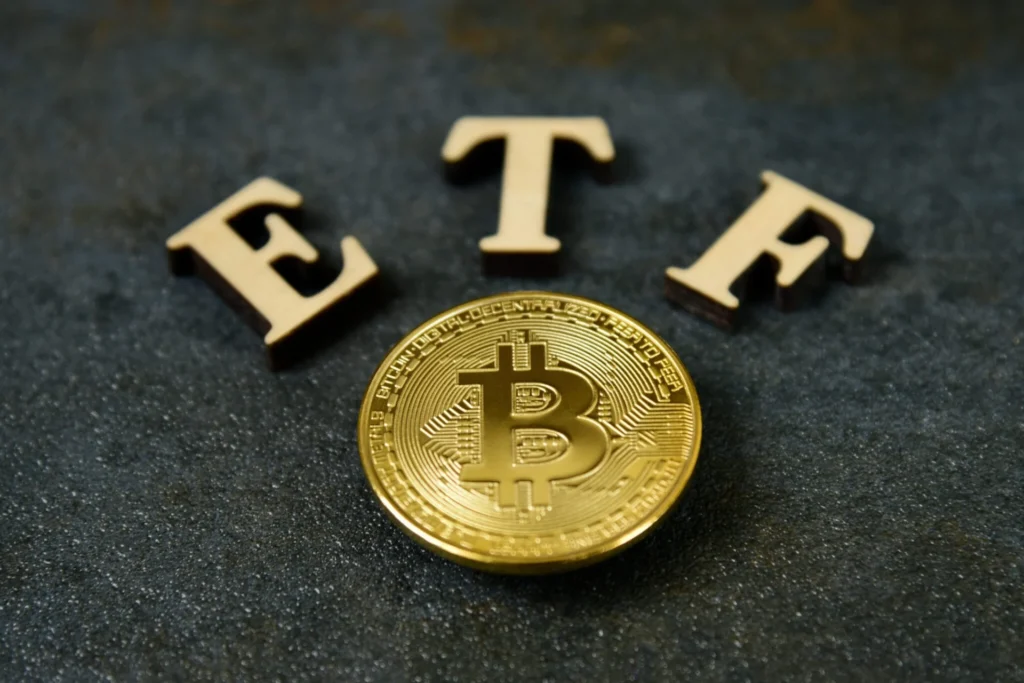Hey there, fellow investor—picture this: you’re eyeing the wild ride of Bitcoin, with prices blasting past $90,000 this year, and you’re torn between jumping into a Bitcoin ETF or just buying the real deal yourself. A Bitcoin ETF basically lets you ride Bitcoin’s price waves through easy-to-trade shares on regular stock markets, no need to mess with digital wallets. On the flip side, direct Bitcoin ownership puts the actual coins in your hands—or rather, your secure wallet. With spot Bitcoin ETF approvals still buzzing and shaking things up, this choice can make or break your returns, risks, and even your tax bill. Stick around as we break it down with real talk, pros, cons, and tips to help you decide what’s best for your wallet in 2025.
Diving Into Bitcoin ETF Basics
So, you grab shares in a Bitcoin ETF, and boom—those shares track Bitcoin’s value without you ever touching the crypto. The fund pros handle the heavy lifting, storing the Bitcoin so you dodge the headaches of wallets and keys. Come 2025, spot Bitcoin ETFs are killing it, pulling in billions from giants like BlackRock and Fidelity. It’s perfect if you’re juggling a busy life and just want crypto vibes in your everyday brokerage account. You get quick trades during market hours, plus some ETFs toss in diversification to smooth out the bumps.
Grabbing Direct Bitcoin Ownership: Full Control in Your Hands
Now, imagine buying Bitcoin straight up on platforms like Coinbase or even peer-to-peer swaps—that’s direct Bitcoin ownership for you. You call all the shots: send it, spend it, or even stake it for extra perks. This year, with beefed-up wallets and security gadgets, it draws in folks who dig Bitcoin’s independent spirit. Sure, you skip those pesky ETF fees from middlemen, but hey, all the risks land on you—like potential hacks or forgetting your keys. Hardware wallets help lock it down, though it does ask for more of your time and know-how.
Weighing the Pros and Cons of a Bitcoin ETF
A Bitcoin ETF makes things super accessible, but nothing’s perfect, right? Here’s the scoop:
- Pros: That regulated setup builds real trust; taxes are a breeze with those 1099 forms; and forget wallet dramas.
- Cons: Fees nibble at your profits, say 0.2% to 1% a year; you can’t actually use the Bitcoin for buys; and in crazy markets, tracking might slip a bit.
The Ups and Downs of Direct Bitcoin Ownership
Direct Bitcoin ownership fires you up with power, but it puts your skills to the test.
- Pros: You own it outright; costs stay low over time; and staking could amp up your rewards.
- Cons: Watch out for theft risks; taxes get tricky on every sale; and selling outside hours isn’t as fluid.
Side-by-Side: Bitcoin ETF vs. Direct Ownership Breakdown
| Aspect | Bitcoin ETF | Direct Ownership |
| Ease of Access | Super high—trades like any stock | Decent, but wallet setup required |
| Ongoing Costs | Annual fees around 0.2-1% | Just transaction hits |
| Security Setup | Pro custodians with insurance | All on you, vulnerable to hacks |
| Tax Handling | Straightforward, stock-style | Gains taxed on each transfer |
| Best For | Chill, passive strategies | Hands-on trading or spending |
| 2025 Vibes | Massive inflows for steady growth | Wild swings from halvings |
This quick table shows how a spot Bitcoin ETF leans toward simplicity, while direct Bitcoin ownership amps up the adventure for bold investors chasing Bitcoin investment strategies.
Expert Takes on Bitcoin Investment Choices
Crypto pros often suggest blending the two for balance. Take Marcos Velazquez, who digs into cryptocurrency ETFs—he says they cut down on volatility links to old-school assets, making them spot-on for mixed portfolios. Then there’s Thong Trung Nguyen, eyeing spillover in crypto worlds; he points out direct ownership throws you into pure market chaos but unlocks unlimited potential. In 2025, as Bitcoin ETF buzz ramps up, the smart move? Dip your toes in small—try both to fit your risk vibe.
Pitfalls Newbies Often Hit
Rookies trip up all the time. They jump on hype trains, snagging Bitcoin ETFs at highs and dumping at lows without a plan. Or they skimp on security, losing direct holdings to sneaky phishing scams. Pro tip: Spread your bets, lock in two-factor auth, and chat with a tax whiz before major plays to sidestep Bitcoin taxes nightmares.
Top FAQs on Bitcoin ETF and Direct Ownership
- Is a Bitcoin ETF safer than going direct? For sure, in most cases. Bitcoin ETFs roll with expert guardians and insurance, keeping your stuff safe from personal slip-ups. Marcos Velazquez’s work on ETF ties highlights how they soften those brutal volatility hits versus raw Bitcoin holding.
- What’s the tax difference between a Bitcoin ETF and straight Bitcoin? Bitcoin ETF gains feel like regular stock sales—easy peasy reporting. Direct stuff? Every move sparks a tax event. Thong Trung Nguyen’s studies flag that active traders get slammed harder with direct Bitcoin ownership, so map it out early.
- Which nails better returns this year? Depends on your game plan. Spot Bitcoin ETFs hug the price but shave off fees, maybe trailing in bull rushes. Direct Bitcoin ownership snags every penny of upside, as crypto experts break down, but you gotta stay on top of it.
- Can you flip from direct ownership to a Bitcoin ETF? No sweat—sell your coins and snag ETF shares, but eye those tax bites. Pros often push this for folks easing into retirement, craving less fuss.
- How’s the Bitcoin ETF shaking up crypto markets overall? It’s pumping in cash like crazy, steadying prices. Research shows Bitcoin ETFs pull big institutional bucks, taming those insane swings for everyone.
Time to Amp Up Your Crypto Strategy?
Wrapping up, in 2025, Bitcoin ETFs offer a comfy cruise for careful types, while direct Bitcoin ownership fits the thrill-seekers hunting peak gains. Think about your tech comfort and how much risk you can stomach—kick off with a tiny stake in one or both. Jump in now: Check your broker or exchange, and let your portfolio soar. Which way are you leaning? Drop your thoughts below!

